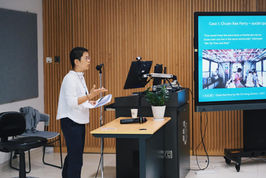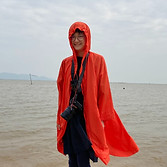
2024 Environmental Humanities Symposium on


Date:
Venue & Location:
Co-Conveners:
13-14 May 2024 (Mon - Tue)
(May 13) C-LP-02, The Education University of Hong Kong, Tai Po, HKSAR;
(May 14) Lamma Island
Highlight Moments


A Gathered Dialogue

Amid the environmental degradation and mass extinction, life and lifeforce is cut short, ruptured, recomposed by industrial capitalism and technocratic development. The afterlives of many become the witness and/or embodiment of slow violence (Nixon 2013) and entangled colonial, racial and environmental injustice.
As agricultural drug diclofenac kills the Gyps Vultures, as ghost fishing nets around the world drown various marine mammals, and as transcorporeal toxicity enacts new modes of “toxic kinship” (Alaimo 2010; Cielemęcka and Åsberg 2019), the multi-dimensional afterlives of “multi-being” (Reid, cited in Price and Chao 2023) require urgent attention and new modes of thought and engagement. Thinking of and with the afterlife in the Anthropocene is to move beyond the human timescale, to dismantle the life and death binary, and to take seriously the ongoing “intra-activities” (Barad 2010) of biotic and abiotic matters.
How might our “weather bodies” (Neimanis and Walker 2014) continue to index the afterlives of heat, rainfall, flood, toxins and the half-lives of radioactive waste? What are the by-products of some supposed sustainable technological (techno-optimistic) methods, and their impacts? As we grapple with these tensions and intricacies, we propose the term “eco-afterlives” to explore and foreground the interconnection and valence of “eco” and “afterlives”, and their spatial, temporal and material dimensions. Approaching eco-afterlives not only attends to the ecological and metabolic cycles of the many beings, but also considers them as relational and situated phenomena. It seeks to explore the way in which these relations impact, structure, make and unmake worlds. The possible ecomediation of afterlife confronts the uneven environmental debt, the hierarchised life and lifeforms, and the unmourned more-than-human death and loss. It invites us to befriend the ghosts and monsters from the Anthropocene ruins, and to speculate with our “oddkin” (Haraway 2016).
The proposition of eco-afterlives also channels us to commoning, reconciliation and hope. Christof Mauch (2019) proposes “slow hope” as a much needed constellation to engage with and counter “slow violence” and its associated paralysing scenarios. Slow hope points to gradual, quiet yet processual endeavours. It inspires us to both explore alternative ways towards a more just and sustainable future and re-story hopeful narratives that are often untold. Practising slow hope compels us to tell stories of vulnerability and counter-stories that attest to both the tenacity of eco-mediations and the limits of extractive logic and ecological traps.
This interdisciplinary symposium seeks to create a space where theory, praxis gather to imagine an onto-epistemological shift in accounting for the ongoing aftermath of anthropocentric disasters and enacting new modes of hope and worlding through the notion of eco-afterlives and slow hope. We are concerned with life, loss, and unevenly distributed environmental impacts. More importantly, we ask: How might the thinking of eco-afterlives enable other kinds of relations of a more-than-human world through eco-mediations? As militarisation, colonialism, nuclear power, plantations and their afterlives continue to haunt and sustain slow violence, how might a different approach to the ambivalent notion of hope (re)story human-environment relations? What are some of the ecological practices that resist the death narrative, and sustain death into life (Rose 2004)?
The opposite of fast is rarely slow (Wang 2023). Rather being slow may be a radical process of unlearning and learning hope otherwise, opening up ways for transformation and reflective reproduction. While highlighting some of the ecological narratives, we also ask: What are the temporal and material dimensions of hope and slowness contextualised in and animated by Hong Kong and other translocal areas? What are the issues, frictions and compromises that may be associated with some ecological initiatives themselves?
We invite you to think of, with, through these questions with us, and one another. By centring environmental humanities scholars and practitioners with particular grounding in Hong Kong and other parts of Asia, and beyond, this symposium attempts to create a space for situated dialogues, collective visions, and the development of practices and actions inspired by translocal tenacious sparks despite the seemingly overwhelming Anthropocene challenges.
References:
Alaimo, Stacy. Bodily natures: Science, environment, and the material self. Bloomington: Indiana University Press, 2010.
Barad, Karen. "Quantum entanglements and hauntological relations of inheritance: Dis/continuities, spacetime enfoldings, and justice-to-come." Derrida today 3, no. 2 (2010) : 240-268.
Cielemęcka, Olga and Cecilia Åsberg. “Introduction: Toxic Embodiment and Feminist Environmental Humanities.” Environmental Humanities 11, no. 1 (2019): 101-7. https://doi.org/10.1215/22011919-7349433.
Haraway, Donna J. Staying with the trouble: Making kin in the Chthulucene. Durham: Duke University, 2016.
Mauch, Christof. "Slow Hope: Rethinking Ecologies of Crisis and Fear." RCC Perspectives, no. 1 (2019): 1-43. https://www.jstor.org/stable/26588127.
Neimanis, Astrida, and Rachel Loewen Walker. "Weathering: Climate change and the “thick time” of transcorporeality." Hypatia 29, no. 3 (2014): 558-575.
Rose, Deborah Bird. Reports from a Wild Country: Ethics for Decolonisation. Sydney: University of New South Wales Press, 2004.
Price, Catherine, and Sophie Chao. "Multispecies, More-Than-Human, Nonhuman, Other-Than-Human: Reimagining idioms of animacy in an age of planetary unmaking." Exchanges: The Interdisciplinary Research Journal 10, no. 2 (2023): 177-193.
Wang, Jamie. (2023). “Summer, black”. Feminist Review, 135, no. 1 (2023): 192-193. https://doi.org/10.1177/01417789231189745.
Keynote Speaker


Professor. Dr. Christof Mauch
Director, Rachel Carson Center for Environment and Society
The Ludwig Maximilian University of Munich, Germany
Christof Mauch is Director of the Rachel Carson Center for Environment and Society, and Chair in American Cultural History at LMU Munich. He is an Honorary Professor at Renmin University in China, a past President of the European Society for Environmental History, and a former Director of the German Historical Institute in Washington, D.C. (1999-2007). Mauch has received many awards for his research and professional engagement including the Teaching Innovation Award of LMU Munich (in 2019 and 2023), the Distinguished Career in Public Environmental History Award of the American Society for Environmental History 2017), and the Planetary Award of the Institute of Future Competences (2015).
Panel Speaker

(Alphabetize by Last Name)

Symposium Agenda
May 13, 2024 (MON) | Hong Kong Time (UTC+8:00)
08:30 - 09:00
Registration
09:00 - 09:15
Opening Remarks:
Prof. John Erni
Dean, Faculty of Humanities, EdUHK
Director, International Research Centre for Cultural Studies, EdUHK, HK
Dr. Zimu ZHANG
Symposium Convenor
Assistant Professor, Department of Literature and Cultural Studies, EdUHK, HK
Dr. Jamie WANG
Symposium Convenor
Research Assistant Professor, Department of Literature and Cultural Studies, EdUHK, HK
09:15 - 10:45
Panel 1:
History and Eco-afterlives of Urban Plants
Speakers: Eric FENG
Maxime DECAUDIN
PAN Lu
Chair: Klaus DITTRICH
10:45 - 11:00
Coffee Break
11:00 - 12:00
Speaker: Christof MAUCH
Chair: Jeffrey CLAPP
*Keynote Talk
Lunch Break
12:00 - 13:00
13:00 - 14:50
Panel 2: More-than-human Materiality and Kinship
Speakers: Daren Shi-chi LEUNG
Kwai Cheung LO
Emily Yu ZONG
Ka-Ming WU
Chair: Bidisha BANERJEE
Coffee Break
14:50 - 15:05
15:05 - 16:30
Panel 3: Oceanic Commons and Amphibious Worlding
Speakers: Kelly Yin Nga TSE
Zimu ZHANG
LEUNG Po-shan Anthony
Chair: Jamie WANG
Coffee Break
16:30 - 16:45
16:45 - 18:30
Panel 4: Eco-communities and Alternative Futures
Speaker: Kiu-wai Chu
Winnie Lai Man YEE
Sipei Stephanie LU
Jamie WANG
Chair: Zimu ZHANG
18:30 - 18:50
Closing Roundtable
19:30 - 21:00
Symposium Dinner at Green Hub
For more details, please refer to the symposium programme below.

Symposium Program
Poster Design by Aubrey Au
All material is copyrighted. Excerpts may be used, provided that full credit is given to the relevant source.
For enquiry, please contact Miss Karmen ZHENG (jzheng@eduhk.hk). Thank you.





























.jpg)
.jpg)

.jpg)








.jpg)
